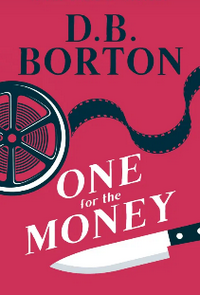Can you describe your initial path to publication with these books, and why are you reissuing them now?
I had been reading a mystery featuring an older woman detective, and the stereotypical portrayal just made me angrier and angrier. I threw the book against the wall and told myself, “I can do better.”
I wrote the book and signed on with an agent, who told me that she’d found the first chapter so hilarious that she’d read it to her sister over the phone. A year passed and I didn’t hear anything from my agent. Meanwhile, my cherished 18-year-old feline companion died (the book is dedicated to her). The grief opened a hole in my life that swallowed everything, including my writing aspirations, and I asked myself why I’d ever thought anyone would want to read my writing. The day after I hit bottom, I pulled myself together, sniveled my way over to the bookstore, and bought a book called How to Write a Mystery. The next day, my long-lost agent called to say that she was very close to selling the book to Berkley. I think the same first chapter sold the book to my editor at Berkley, who, as it turned out, also edited the series about an older woman detective that had made me so angry to begin with.
The first chapter never appeared in the final book. In it, the 59-year-old protagonist got her period in a department store dressing room, and had an epiphany: if Mother Nature couldn’t provide her with the Change of Life, she would have to make her own change. Some early readers advised Berkley against including it.
As for why I’m reissuing the series now, the economics of independent publishing has a lot to do with it. Series tend to be more profitable than single books. That’s the economic answer. But this series has always inspired a strong loyalty in many readers, who seem to identify with the protagonist. Over the years, I’ve continued to receive the occasional inquiry from a fan (or a fan’s daughter) looking for a complete set.
The community that Cat builds (or finds building around her?) in the apartment that ends up giving assistance and support to her is a frequent feature in female P.I. novels. Is there a particular reason for that, what is it about a female P.I./P.I.-type protagonist that lends itself to that in a way that your typical male P.I. doesn’t? How did you pick your residents of Catatonia Arms?
Interesting question. Women have, of course, traditionally done the cultural work of community building, so I suppose their take on detective fiction reflects that. But when I think of the classic writers, that strong sense of community isn’t there. Miss Marple is strongly identified with St. Mary Mead, and she often finds mystery when she’s off visiting friends, but the recurring characters are few. Girl detectives, on the other hand, have been embedded in communities since the modern girl detective emerged in L. Frank Baum’s Mary Louise series. At first, girls weren’t taken seriously as readers (or purchasers of detective novels), but when they were, publishers wanted to reflect the experiences and interests of their readers. So like Nancy Drew, Bess, and George, girl detectives have always traveled in packs, or at least in pairs.
I’m not really sure how I picked the residents of the Catatonia Arms, except to say that they all bring special knowledge and skills with them. Adding a retired cop at the end of the first book really completed that skill set while giving Cat an older ally against the young people.
There are a number of characters I’d like to ask you about, but I’m going to limit myself to Phyl Stinger, was there a particular historical inspiration for her? If not, just where did she come from?
I guess she’s a composite of several Hollywood screenwriters I’d read about and my imagination — writers like Frances Marion, Anita Loos, and June Mathis. I imagined that they’d have to have been tough as nails to survive in Hollywood.
I loved the way that Cat drew from her reading to guide her through her investigation/expectations of the P.I. job/wardrobe. Unless I’m mistaken, Spenser was the most prominent source of inspiration—is that because of something about the character himself, or given the time period, was he just the easiest to reference? Is there someone you wanted to work in a reference to, but couldn’t quite fit in?
I’d say that Robert B. Parker was a big influence on me. He’s a male writer who created the kind of community you were talking about around his male P.I. Spenser. The Spenser books have a lot of heart, and they’re very funny. Later books in the series reference other fictional detectives, like Kinsey Millhone, V. I. Warshawski, and Kinky Friedman.
Let’s play “Online Bookstore Algorithm” (a game I’ve recently invented). What are 3-5 books whose readers may like One for the Money?
Oh, I like this game! As someone who’s always looking for comparable authors for advertising purposes, I’d love to hear what other people would say. A recent reviewer said that fans of Dorothy Gilman’s Mrs. Pollifax and Sue Grafton’s Kinsey Millhone would like it, and I’d agree. Also fans of Elizabeth Peters’s Amelia Peabody and, of course, Christie’s Miss Marple. Jana Deleon’s Miss Fortune series features some older women detectives who are a lot of fun.
What’s next for D. B. Borton?
I’ve been working on a standalone about a librarian who inherits a fortune, a valuable library, and a dangerous mission to return a handful of library books. I’m also planning to reissue the rest of the Cat Caliban books. And I’ve started thinking about a new Cat Caliban.
Thanks for your time, and this fun read, I’m looking forward to working my way through the rest of the series





